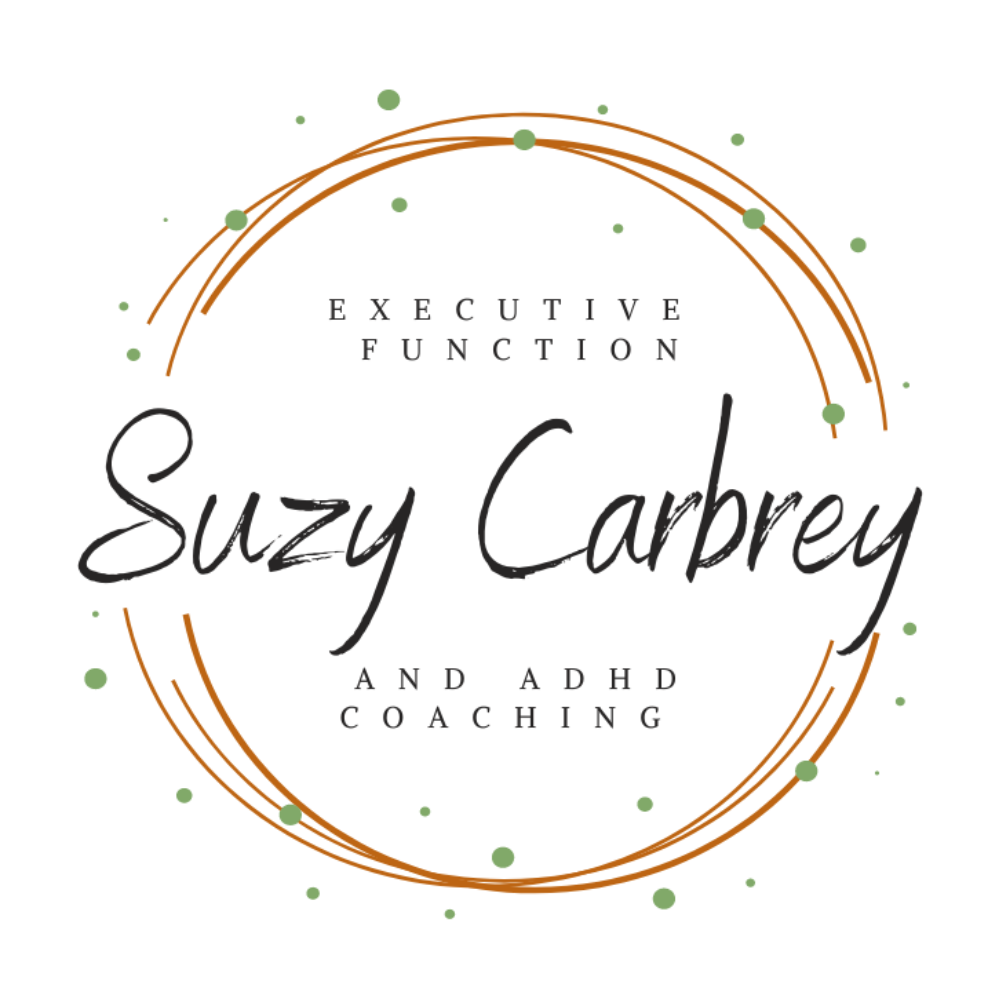Parenting is one of the most demanding jobs out there, physically, emotionally, and cognitively. It asks us to juggle logistics, manage emotions, set routines, plan ahead, and remain flexible in the face of the unexpected. Sound familiar? That’s executive functioning in action. But what happens when the parent is the one who struggles with executive functioning?
Whether you have ADHD, anxiety, depression, or just a brain that doesn’t sync well with traditional expectations, you may feel the tension between wanting to support your kids and managing your own inner world. You might wonder: How can I teach organization when my own system is chaos? How do I model emotional regulation when I feel easily overwhelmed?
Here’s the good news: You don’t need to be perfect to be a powerful model. In fact, learning alongside your kids and modeling self-compassion, problem-solving, and flexibility can be one of the most impactful gifts you give them.
What Is Executive Functioning, and Why Does It Matter in Parenting?
Executive functioning is the set of cognitive skills that help us manage ourselves and our tasks. These skills include:
- Planning and organizing
- Starting and finishing tasks
- Remembering what needs to be done
- Regulating emotions
- Managing time and attention
- Shifting gears when plans change
- Self-monitoring and reflecting
These skills don’t just make adult life easier; they shape how we respond to our children’s needs. They help us follow through on promises, create consistency, stay calm during tantrums, and guide our kids toward independence.
If your own executive functioning feels shaky, you might experience:
- Trouble setting or keeping routines
- Difficulty transitioning your child between tasks
- Forgetting appointments, school forms, or lunch prep
- Emotional outbursts when overstimulated or tired
- Feeling reactive instead of proactive
This doesn’t make you a bad parent. It makes you human. And it means your path may look different, but it can still be intentional, loving, and supportive.
Modeling Matters (Even If It’s Imperfect)
Kids learn not just from what we say, but from what we do. This is both powerful and intimidating, especially if you feel like your current habits are a little messy. But modeling isn’t about perfection. It’s about showing your child how to:

- Try strategies and adjust when they don’t work
- Stay curious about what helps them function best
- Name their feelings and needs
- Repair when things go off the rails
- Celebrate effort, not just outcomes
When you’re honest about your own challenges and how you’re working through them, you’re modeling lifelong skills like self-awareness, adaptability, and resilience.
Instead of trying to model ideal behavior, try modeling growth. For example:
- “I had a hard time getting started today, so I used a timer to help me begin. Want to try it with me?”
- “I forgot your permission slip. Let’s figure out a backup plan together.”
- “I lost my patience earlier, and I’m really sorry. Next time I’m going to take a few deep breaths before responding.”
These small moments show your child that struggling isn’t failure, it’s part of learning.
Tip 1: Name What’s Hard Without Shame
It can feel vulnerable to admit that executive functioning doesn’t come easily to you, especially if you’ve spent years trying to “just push through.” But naming what’s hard helps reduce shame, both for you and for your child.
When you say things like:
- “It’s tricky for me to stay on top of paperwork, so I’m building a new system for it.”
- “I get overwhelmed by noise, and it’s hard for me to focus when it’s loud.”
- “Sometimes my brain wants to scroll instead of clean. I’m working on that.”
You give your child permission to acknowledge their own challenges without feeling broken.
The key is to pair honesty with a problem-solving mindset. Instead of “I’m just bad at this,” try “This part is hard, and I’m figuring out what helps.”
Tip 2: Co-Create Systems That Work for Your Family
Traditional advice about routines and systems can feel rigid and overwhelming, especially if your brain doesn’t work in a linear, step-by-step way. Instead of trying to recreate a Pinterest-worthy structure, focus on co-creating routines that are functional, flexible, and brain-friendly.
Some ideas:
- Use visual checklists for shared tasks (like morning or bedtime routines)
- Break down steps into micro-tasks, and celebrate each one
- Choose one or two anchor habits (like brushing teeth or putting shoes in a basket) instead of trying to overhaul everything
- Build “invisible supports” into your home, like leaving a bin by the door for library books or pre-packing lunches the night before while watching TV

If your child also struggles with executive functioning, creating systems together can be a powerful bonding experience. You’re saying: Let’s figure this out as a team.
Tip 3: Use External Tools and Cues And Talk About Them
People with executive functioning challenges often benefit from externalizing their supports. This means moving tasks and reminders out of your brain and into the world, where they’re more visible and easier to act on.
This can include:
- Dry erase boards
- Timers or alarms
- Sticky notes on the fridge or mirror
- Visual schedules
- Color-coded folders
- Habit trackers
Rather than hiding these supports, normalize them. Say things like:
- “This timer helps me remember when it’s time to stop scrolling and start dinner.”
- “Let’s both check our to-do boards to see what’s next.”
- “I’m using a sticky note to help me remember your field trip is tomorrow.”
This not only helps you function more smoothly, it gives your child permission to use supports without embarrassment.
Tip 4: Focus on Regulation First, Then Execution
When emotions run high, yours or your child’s, executive functioning tends to shut down. It’s nearly impossible to plan, reflect, or follow directions when you’re in fight, flight, or freeze.
That’s why it’s so important to focus on nervous system regulation before trying to tackle behavior or tasks. If you find yourself snapping, shutting down, or spiraling into guilt, ask:
- Do I need a break?
- Is my sensory environment overstimulating?
- Am I hungry, tired, or touched out?
- Do I need to move my body or get outside?

Model regulation strategies in front of your child, like:
- “I’m starting to feel overwhelmed. I’m going to take a minute to breathe and stretch.”
- “Let’s put on calming music while we clean up. It helps me focus.”
- “It’s been a long day, how about we have a quiet moment together?”
By showing your child how you notice and respond to dysregulation, you’re teaching them the foundation for all other executive skills.
Tip 5: Practice Repair and Resilience
Every parent loses their cool sometimes or forgets something important. When that happens, the most powerful move you can make is repair.
Repair teaches kids:
- Everyone makes mistakes
- It’s possible to take responsibility without self-blame
- Relationships can grow stronger through honesty
Try saying:
- “I didn’t handle that the way I wanted to. Can we talk about it?”
- “I yelled, and that’s not okay. I’m sorry. I’m working on managing my stress differently.”
- “I forgot to pack your lunch. That must’ve been frustrating. I’m going to set a reminder for tomorrow.”
These conversations matter more than getting it “right” every time. They build trust, emotional safety, and a model of what it means to be human and still show up.
Tip 6: Choose One Small Shift at a Time
When you’re motivated to make changes for your family, it’s easy to fall into all-or-nothing thinking: We need better routines, healthier meals, fewer screens, more structure, less yelling, and improved bedtime rituals… starting Monday.
Pause. Breathe. Start small.
Pick one area that feels especially important or high-friction. Maybe it’s:
- Getting out the door in the morning
- Remembering after-school activities
- Managing transitions without meltdowns
- Finishing homework without nagging
Choose a micro-shift that supports that area, such as:
- A visual checklist taped to the door
- A shared Google Calendar with alerts
- A transitional phrase like “2-minute warning” before switching tasks
Track how it’s going, adjust as needed, and don’t be afraid to scrap what doesn’t work. Sustainable change grows from experimentation, not perfection.
Tip 7: Find Community and Support
Parenting with executive functioning challenges can feel isolating. You may worry that other parents have it more together, or that your struggles are invisible to others. But you’re not alone.
Support can look like:
- ADHD or neurodivergent parenting groups
- Therapy or coaching focused on executive functioning
- Sharing wins and challenges with friends who “get it”
- Reading books or listening to podcasts by neurodiverse creators
And if you’re parenting a child who also struggles with executive functioning, remember: you are uniquely equipped to understand their world. You don’t need to have it all figured out. Your lived experience gives you insight, empathy, and a willingness to co-create solutions rather than impose them.
You’re Already Modeling Something Powerful
If you’re reading this post, it means you care deeply about how to support your child while managing your own needs. That care alone is a powerful model.
You’re showing your child that:
- Growth matters more than perfection
- It’s okay to need help
- Self-compassion and curiosity are tools for change
- Struggling doesn’t mean failing

By embracing the reality of your own brain and learning how to work with it, you give your child permission to do the same. Together, you can build a family culture rooted in understanding, flexibility, and mutual respect.
And that? That’s executive functioning in action.
Learn more with Online Coaching for Executive Functioning / ADHD
Ready to gain control and enhance your executive functioning? As an experienced and compassionate coach, I specialize in providing support for executive functioning and ADHD. To embark on your journey, please reach out to me at 708-264-2899 or email hello@suzycarbrey.com to schedule a FREE 20-minute discovery call consultation.
With a background as a speech-language pathologist, I have a strong foundation in executive functioning coaching. My graduate degree program in SLP placed a significant emphasis on cognition, including executive functions, and I have years of experience in medical rehabilitation, providing cognitive-communication therapy. Additionally, I have completed an ADHD Services Provider certification program, I am Solutions-Focused Brief Therapy Diamond Level 1 certified and I am trained in the Seeing My Time® executive functioning curriculum.
Experience the convenience and effectiveness of online coaching, backed by studies that demonstrate equal results to in-person services. Parents, professionals, and emerging adults love the convenience and privacy of receiving coaching from their own homes.
Whether you reside in Chicago, Milwaukee, Indianapolis, Kansas City, or anywhere else around the globe, I am here to assist you. Schedule your discovery call consultation today, and I eagerly anticipate the opportunity to work with you!
Please note that although I am a certified speech-language pathologist, all services Suzy Carbrey LLC provides are strictly coaching and do not involve clinical evaluation or treatment services. If you require a formal speech therapy evaluation and treatment, please inform me, and I can provide appropriate recommendations.

